Mitigating Risk Factors for Diplomat Kids
Tanya crossman and lauren mccall
When TCK Training released our white paper, Caution and Hope: The Prevalence of Adverse Childhood Experiences in Globally Mobile Third Culture Kids, we were only beginning to scratch the surface of the data we collected from 1,904 individuals who completed our 2021 survey on childhood trauma in globally mobile Third Culture Kids. In our second white paper, TCKs at Risk: Risk Factors and Risk Mitigation for Globally Mobile Families, we looked at 12 risk factors and ways to mitigate these risks. This article is part of a series of blog posts that looks a little deeper at certain sub-groups represented in the data.
Mitigating Risk Factors for Diplomat Kids
One of the core reasons families move away from their passport country by choice, taking children with them, is in service to their country’s government.
In the course of our research into Adverse Childhood Experiences among globally mobile young people, we learned a lot of difficult truths about what diplomat kids experienced. This blog post will discuss the prevalence of various types of abuse and neglect, but no graphic descriptions.
In almost every category of child maltreatment, except for physical neglect, diplomat kids reported higher rates than other TCK sectors. TCKs who grew up in foreign service families were five times more likely than Americans to experience emotional abuse. 1 in 5 diplomat kids reported a household adult dealing with substance abuse and 45% reported feeling neglected.
In almost every category of child maltreatment, except for physical neglect, diplomat kids reported higher rates than other TCK sectors. TCKs who grew up in foreign service families were five times more likely than Americans to experience emotional abuse. 1 in 5 diplomat kids reported a household adult dealing with substance abuse and 45% reported feeling neglected.
Internationally mobile families and children are often viewed as privileged, and therefore not at risk of ACEs, PTSD, or other mental health struggles. This data suggests the opposite.
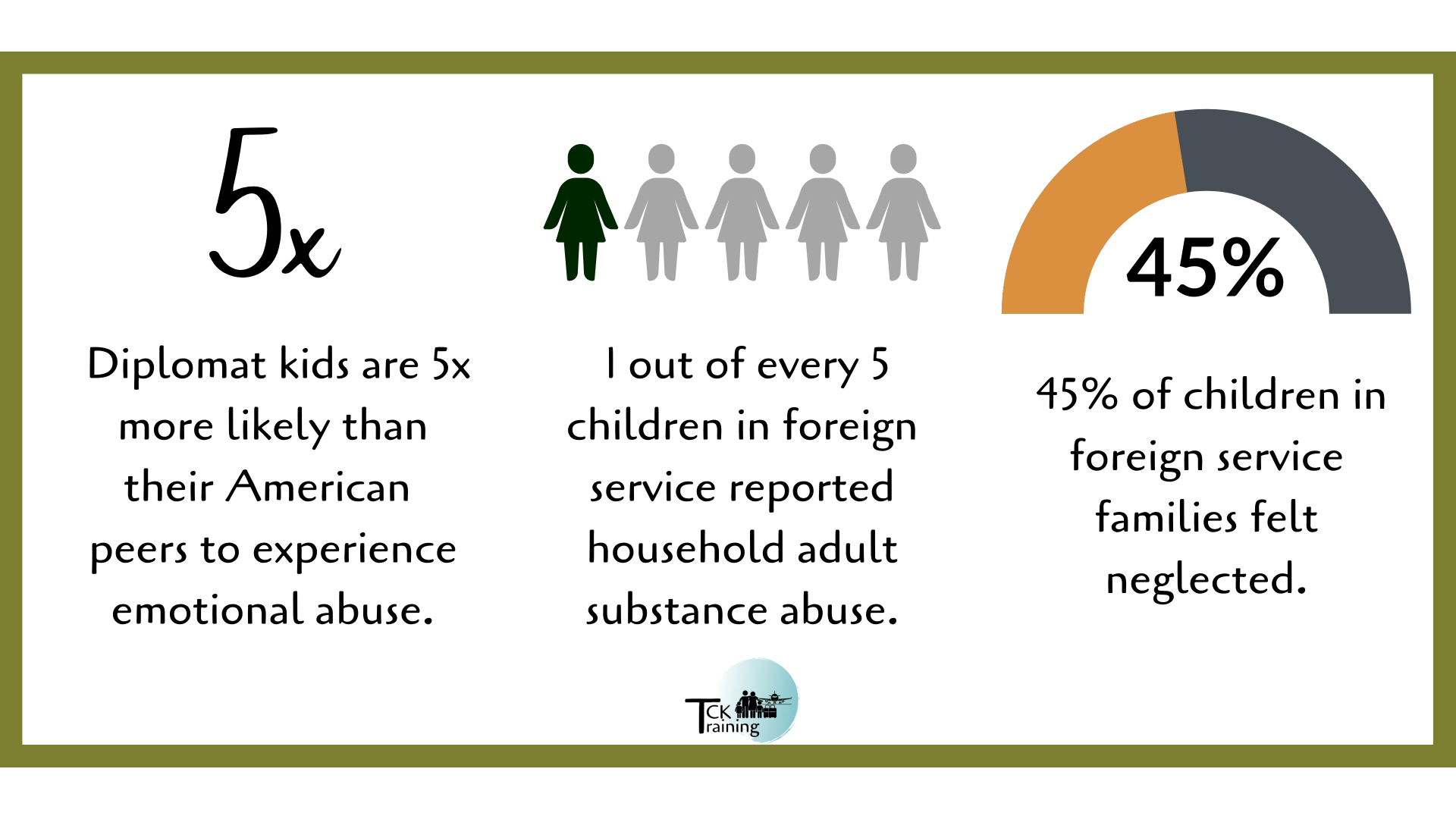
Adverse Childhood Experiences (ACEs)
Research into ACEs has taken place worldwide across 25 years. The ten ACE factors are divided into Child Maltreatment (abuse and neglect directly suffered as a child) and Household Dysfunction (factors affecting the childhood living environment). The ACE questionnaire asks about childhood experiences without using the words "abuse" or "neglect" - helpful for catching abusive or neglectful experiences a person would not label that way themselves. We often compare our results to the CDC-Kaiser study of 17,000 Americans, as this is the largest ACE study done worldwide to date. Comparisons with other global populations can be found in our white paper.
We saw consistently different results across categories among TCKs born before/after 1980 – with the Boomer/Gen X generations on one side, and the Millennial/Gen Z generations on the other. This also delineates the groups who were/were not impacted by the internet during childhood.
Abuse
Abuse is broken down into three categories: physical, emotional and sexual. Diplomat kids in our survey were 1.5 times more likely to experience physical abuse than TCKs overall. Sexual abuse among diplomat kids was also over 1.5 times higher than the CDC-Kaiser average. Diplomat kids reported the second highest rate of grooming among the various sectors, at 29%. Only Edu-NGO kids reported a higher rate. While grooming is not included in the ACE inventory, it is worth considering as 81% of TCKs who reported experiencing grooming also reported experiencing sexual abuse during childhood.
Research into ACEs has taken place worldwide across 25 years. The ten ACE factors are divided into Child Maltreatment (abuse and neglect directly suffered as a child) and Household Dysfunction (factors affecting the childhood living environment). The ACE questionnaire asks about childhood experiences without using the words "abuse" or "neglect" - helpful for catching abusive or neglectful experiences a person would not label that way themselves. We often compare our results to the CDC-Kaiser study of 17,000 Americans, as this is the largest ACE study done worldwide to date. Comparisons with other global populations can be found in our white paper.
We saw consistently different results across categories among TCKs born before/after 1980 – with the Boomer/Gen X generations on one side, and the Millennial/Gen Z generations on the other. This also delineates the groups who were/were not impacted by the internet during childhood.
Abuse
Abuse is broken down into three categories: physical, emotional and sexual. Diplomat kids in our survey were 1.5 times more likely to experience physical abuse than TCKs overall. Sexual abuse among diplomat kids was also over 1.5 times higher than the CDC-Kaiser average. Diplomat kids reported the second highest rate of grooming among the various sectors, at 29%. Only Edu-NGO kids reported a higher rate. While grooming is not included in the ACE inventory, it is worth considering as 81% of TCKs who reported experiencing grooming also reported experiencing sexual abuse during childhood.
Another issue not addressed by the ACE questionnaire is that of grooming. These are ways that predators prepare children for potential future abuse.
Emotional abuse is an even harder story. Diplomat kids were five times more likely to experience emotional abuse than Americans in the CDC-Kaiser study. Among non-mission TCKs, diplomat kids had the highest rate of emotional abuse, with business kids a close second.
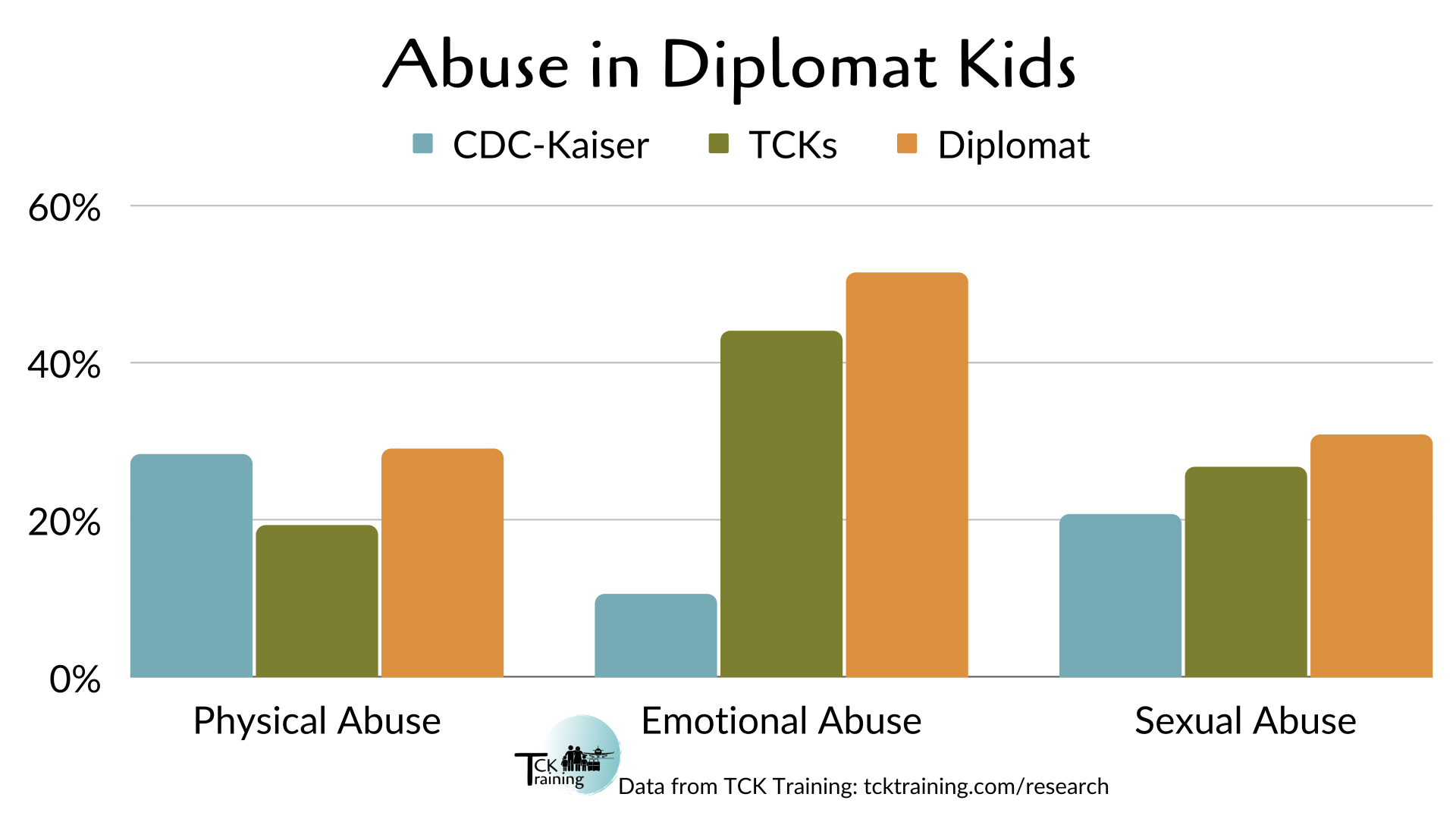
When we split the results by age, there is a big difference. Diplomat kids born before 1980 reported the lowest rate of emotional abuse of all older TCKs (38%), but 60% of those born after 1980 reported experiencing emotional abuse, meaning younger diplomat kids reported the highest rate of emotional abuse.
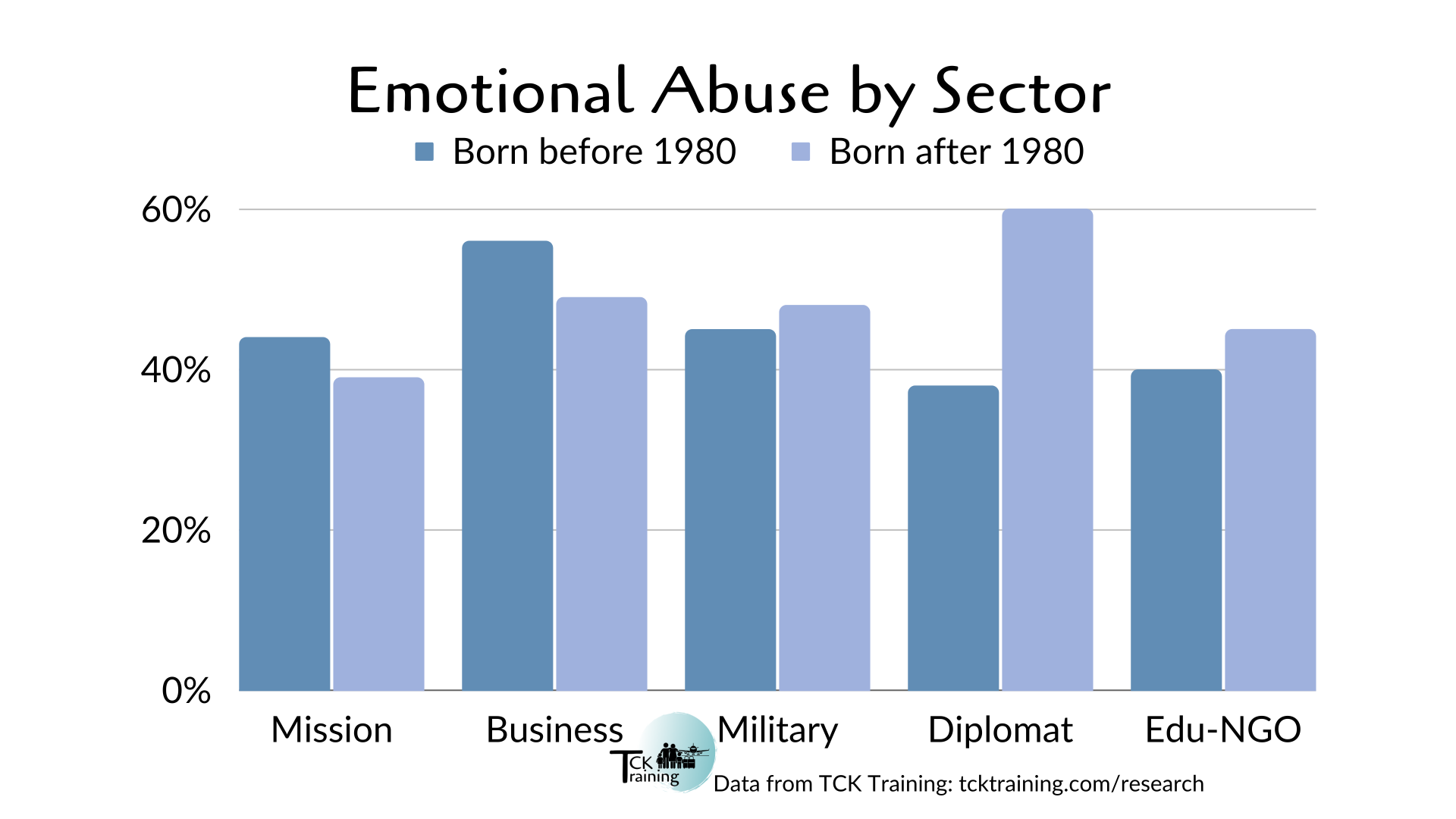
While these results show only the prevalence of emotional abuse and not its cause, we believe that the stresses of life in the time of 24 hour news cycles and social media has made family life even more difficult.
I remember my parents always being ‘on’, or as my mom says, “dressed for press.” For kids with parents in jobs that are very political, like embassies, and living with and going to school with people whose parents know yours, there is a strong feeling that your actions, successes and failures will be reflected on your parents.
Arielle, age 24 (American diplomat kid quoted in Misunderstood: The Impact of Growing Up Overseas in the 21st Century, p286)
Neglect
Neglect is defined through the lens of perception, where a child feels/worries their emotional/physical needs will not be met. While physical neglect is often seen as an extension of poverty, in the ACE context it is not just about what the child has access to but also about their security that provision will continue in the future. Physical neglect among diplomat children was nearly completely absent, at 3%.
Emotional neglect, however, was a different story. In the case of emotional neglect, the diplomat kid grew up feeling unloved, unimportant or not special – whether or not their parents actually did love them. For Boomer/Gen X diplomat kids (those born before 1980), the rate of emotional neglect was fairly average for TCKs, at 35%. However, diplomat kids born after 1980 reported emotional neglect at a rate of 51%: the highest rate of all sectors, and nearly 1.5 times the rate of those in prior generations of diplomat kids.
Neglect is defined through the lens of perception, where a child feels/worries their emotional/physical needs will not be met. While physical neglect is often seen as an extension of poverty, in the ACE context it is not just about what the child has access to but also about their security that provision will continue in the future. Physical neglect among diplomat children was nearly completely absent, at 3%.
Emotional neglect, however, was a different story. In the case of emotional neglect, the diplomat kid grew up feeling unloved, unimportant or not special – whether or not their parents actually did love them. For Boomer/Gen X diplomat kids (those born before 1980), the rate of emotional neglect was fairly average for TCKs, at 35%. However, diplomat kids born after 1980 reported emotional neglect at a rate of 51%: the highest rate of all sectors, and nearly 1.5 times the rate of those in prior generations of diplomat kids.
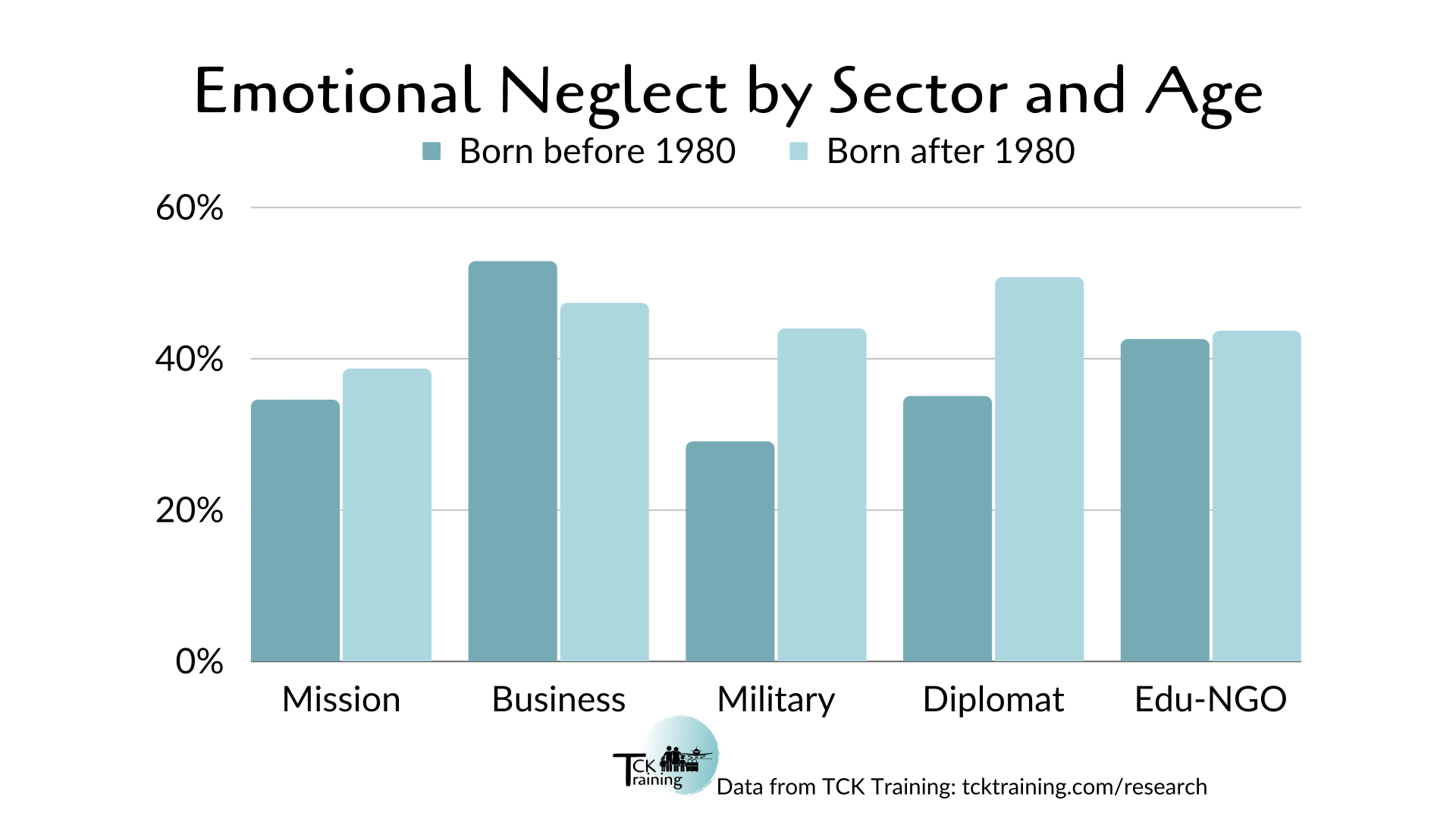
Household Dysfunction
Household dysfunction encompasses household adult mental illness, parental violence, parental divorce or separation, household adult incarceration, and household adult substance abuse. Incarceration was so low among TCKs that we have not included it in this summary.
Household Adult Mental Illness
Household adult mental illness is an ACE assigned to anyone who had an adult living in their home during childhood who was depressed, mentally ill, or attempted suicide. 39% of TCKs and 35% of diplomat kids reported household adult mental illness. Again, age made a difference. Only 25% of older diplomat kids reported household adult mental illness, compared to 42% of younger diplomat kids – a more than 1.5 times increase. That said, younger TCKs regardless of sector all reported household adult mental illness at similar rates, from 42%-44%.
Household dysfunction encompasses household adult mental illness, parental violence, parental divorce or separation, household adult incarceration, and household adult substance abuse. Incarceration was so low among TCKs that we have not included it in this summary.
Household Adult Mental Illness
Household adult mental illness is an ACE assigned to anyone who had an adult living in their home during childhood who was depressed, mentally ill, or attempted suicide. 39% of TCKs and 35% of diplomat kids reported household adult mental illness. Again, age made a difference. Only 25% of older diplomat kids reported household adult mental illness, compared to 42% of younger diplomat kids – a more than 1.5 times increase. That said, younger TCKs regardless of sector all reported household adult mental illness at similar rates, from 42%-44%.
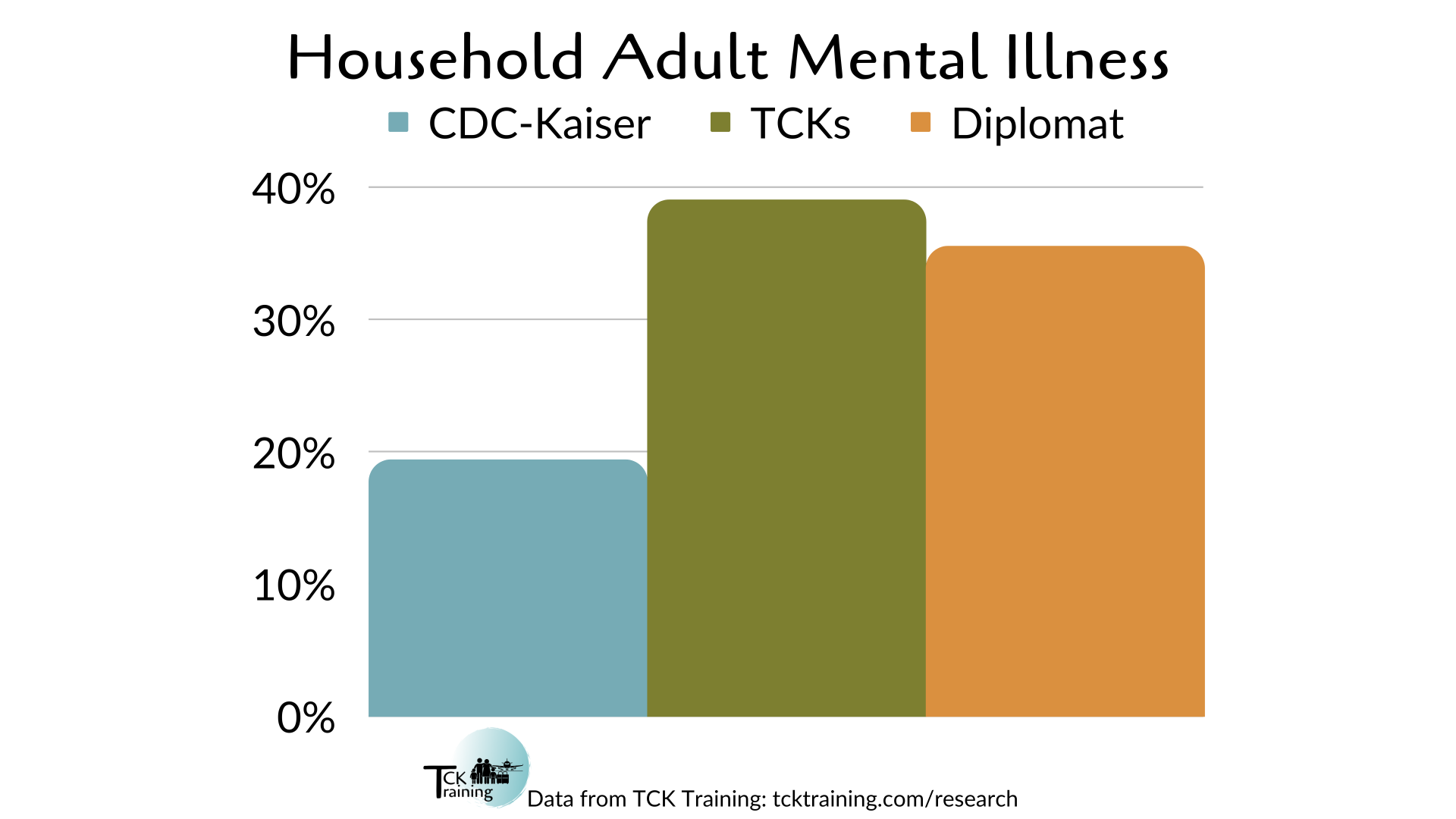
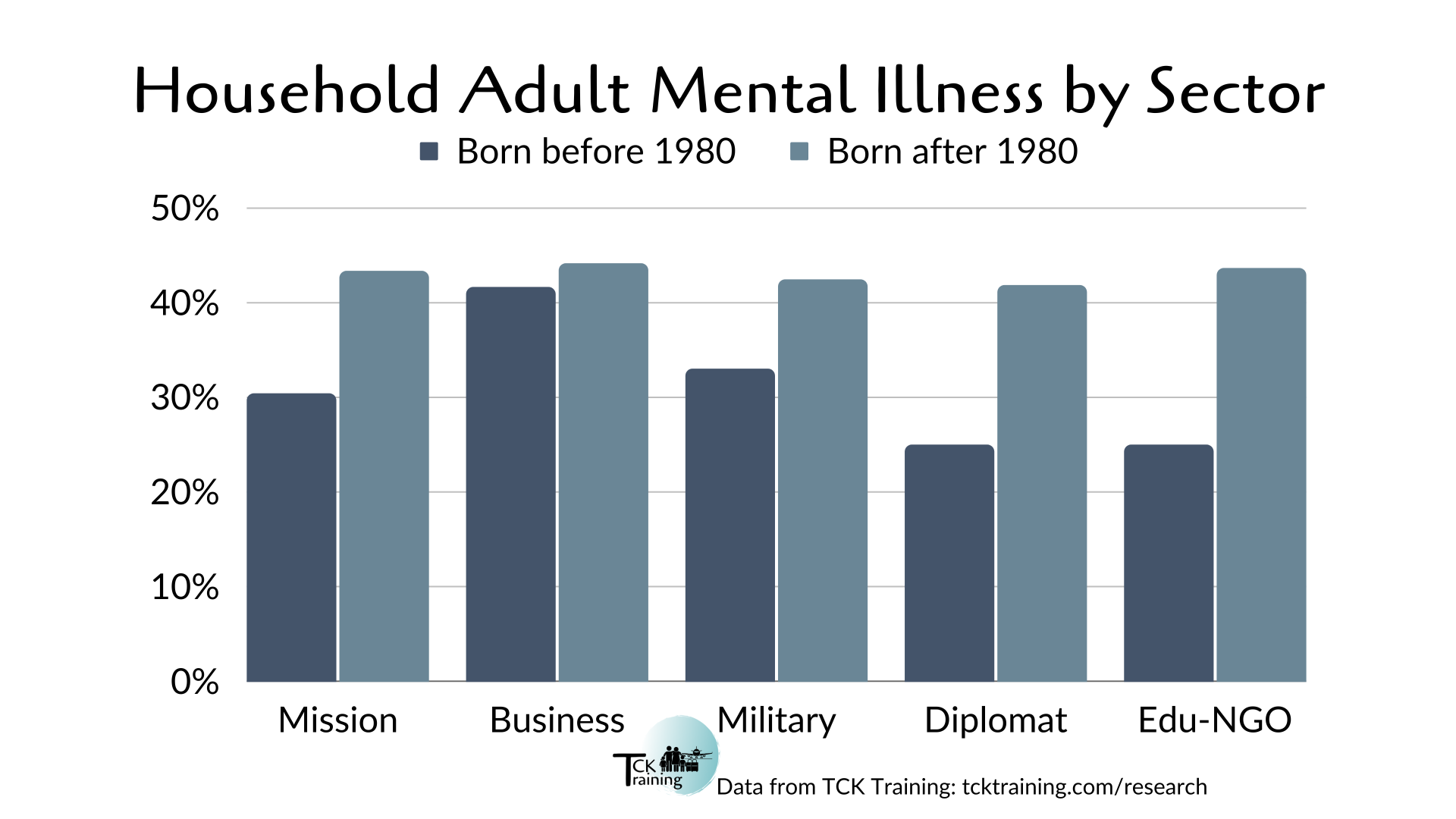
Parental Violence
Parental violence is defined as a child being impacted by, even if not actually witnessing, violence toward a mother/step-mother or father/step-father. 7.5% of diplomat kids reported parental violence, with no difference by age.
Parental violence is defined as a child being impacted by, even if not actually witnessing, violence toward a mother/step-mother or father/step-father. 7.5% of diplomat kids reported parental violence, with no difference by age.
Nearly 1 in 10 TCKs raised in foreign service families reported the presence of parental violence…It is vital that everyone who cares for TCKs be educated on what domestic abuse is, how to recognize it, and how to support families and children when domestic abuse is present.
The support needed can be challenging to find while living abroad, but it is vital to extend services to these families in crisis.
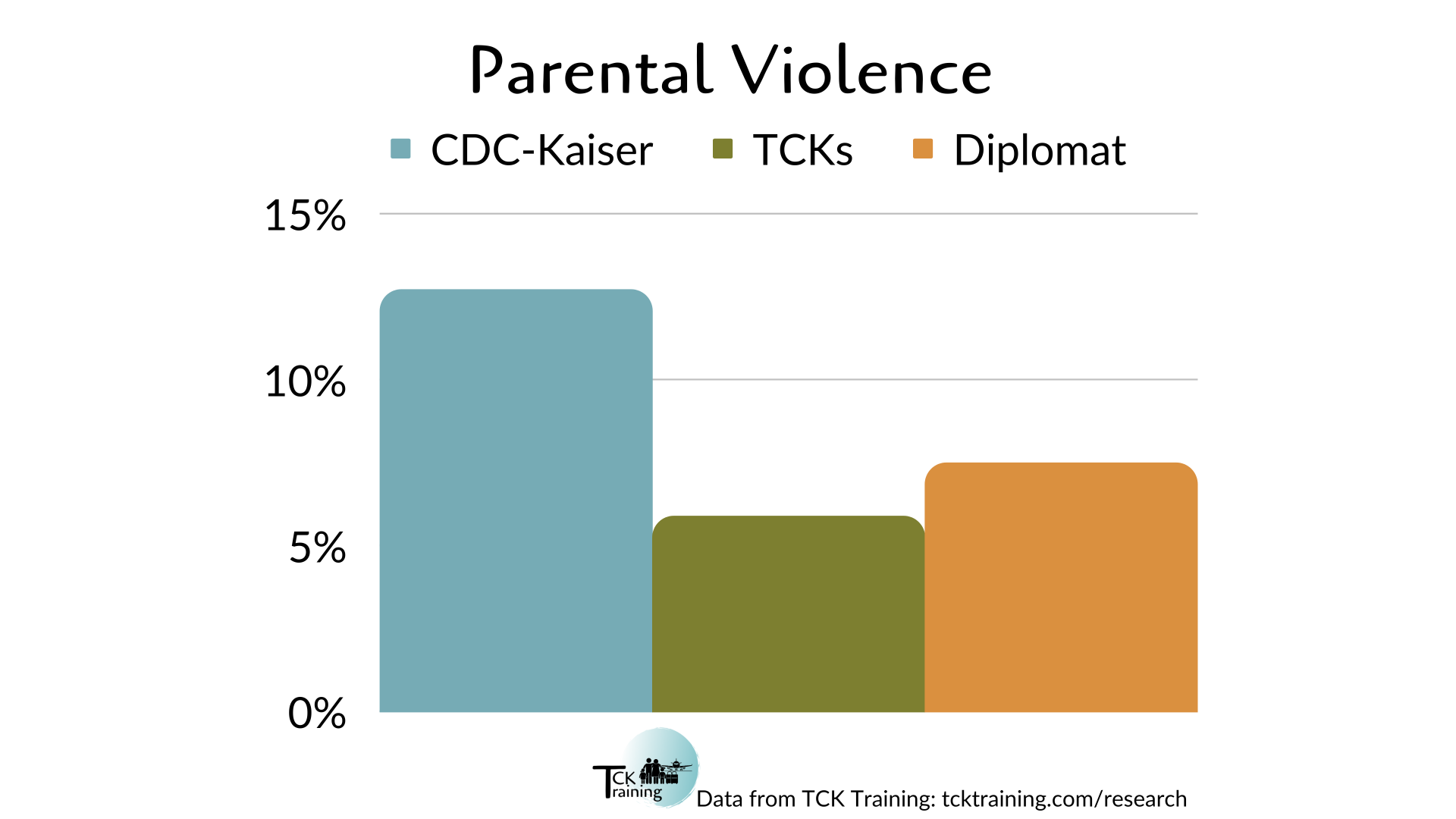
Divorce/Separation
While parental divorce/separation was 23% in the CDC-Kaiser study, it was only 6.5% for diplomat kids (similar to other TCKs). Although all sectors saw a decrease in the divorce rate over time, in the diplomat sector the decrease was significant: more than halving from 10% in those born before 1980, to 4.5% for younger TCKs.
While parental divorce/separation was 23% in the CDC-Kaiser study, it was only 6.5% for diplomat kids (similar to other TCKs). Although all sectors saw a decrease in the divorce rate over time, in the diplomat sector the decrease was significant: more than halving from 10% in those born before 1980, to 4.5% for younger TCKs.
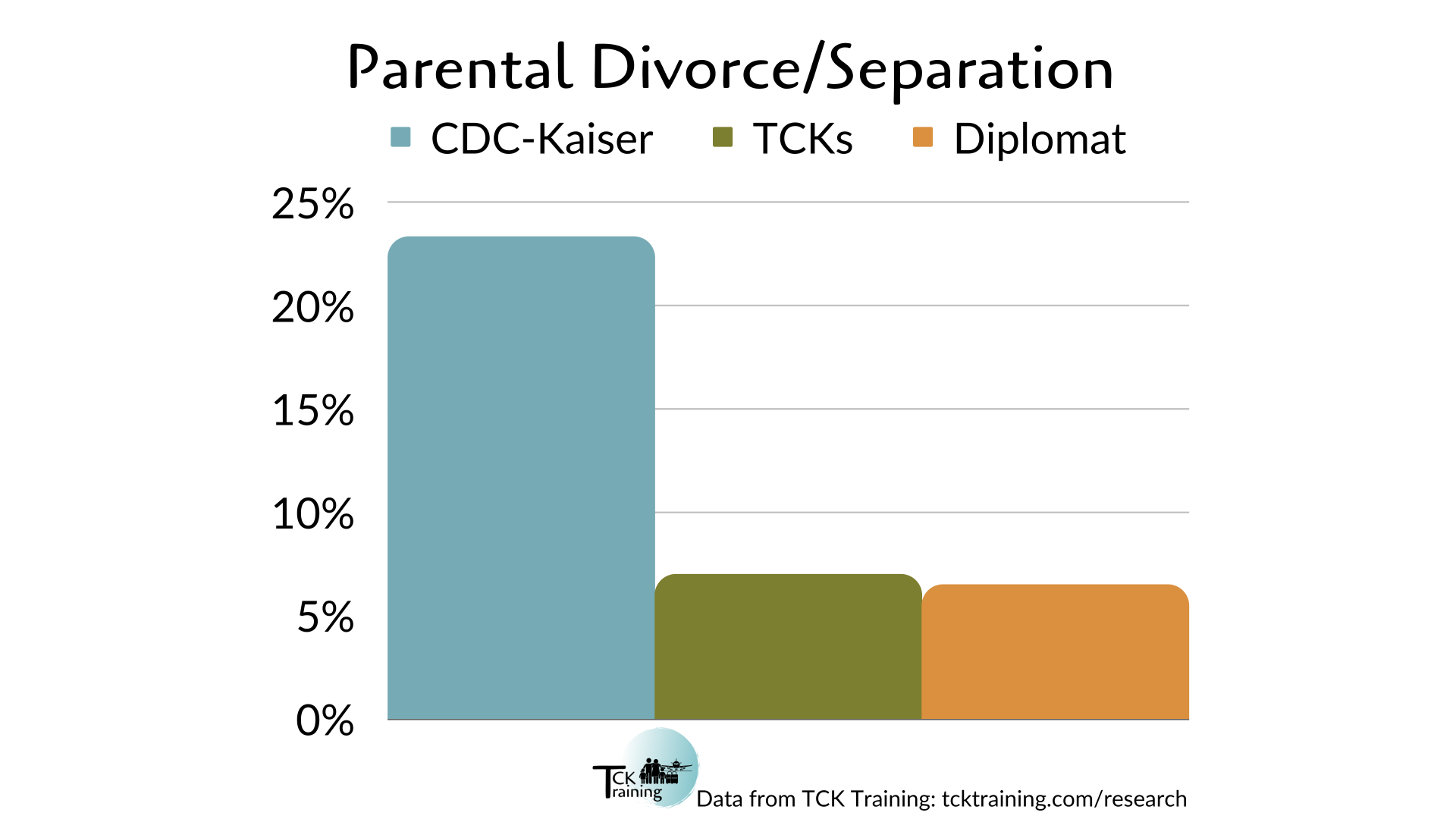
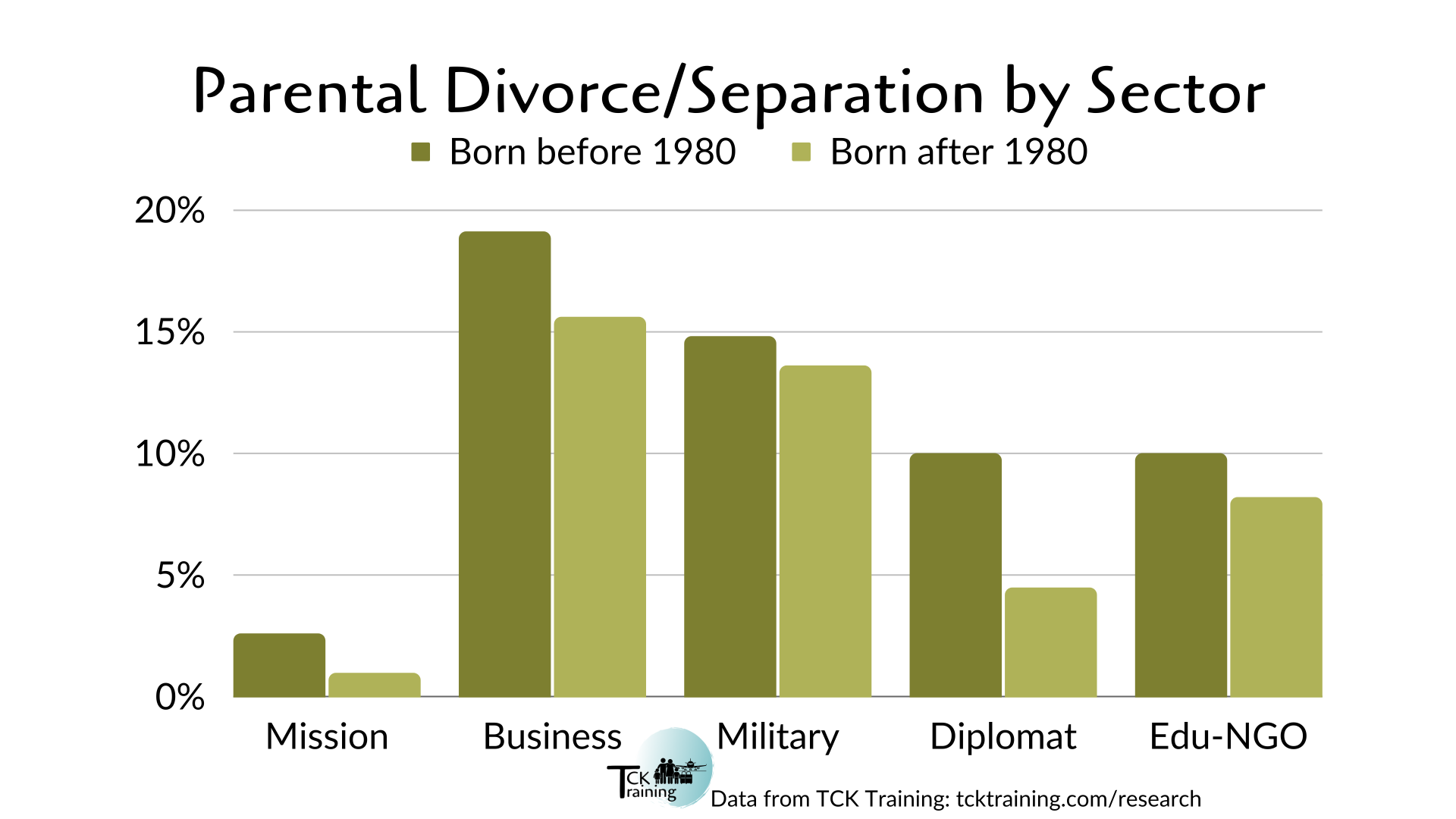
As we said earlier, these numbers can only show correlation and not causation. Just as higher rates of emotional abuse and neglect do not necessarily mean foreign service parents are bad parents, the lower divorce rate does not necessarily mean they have better marriages.
Substance Abuse
Substance abuse as an ACE factor required that an adult living in the home was an alcoholic or used illicit drugs. Although far fewer diplomat kids reported a substance-abusing adult in their home compared to the CDC-Kaiser participants, they reported it at nearly two times the rate that other TCKs did.
18% of diplomat kids reported household adult substance abuse, compared to 27% in the U.S. and 10% of all TCKs. There was also a small increase by age, from 17.5% in older diplomat kids to 19% of those born after 1980. The foreign service sector was the only non-mission sector that did not experience a decrease in the reported rate of substance abuse. We see this as a sign that these families are under particular pressure.
Substance Abuse
Substance abuse as an ACE factor required that an adult living in the home was an alcoholic or used illicit drugs. Although far fewer diplomat kids reported a substance-abusing adult in their home compared to the CDC-Kaiser participants, they reported it at nearly two times the rate that other TCKs did.
18% of diplomat kids reported household adult substance abuse, compared to 27% in the U.S. and 10% of all TCKs. There was also a small increase by age, from 17.5% in older diplomat kids to 19% of those born after 1980. The foreign service sector was the only non-mission sector that did not experience a decrease in the reported rate of substance abuse. We see this as a sign that these families are under particular pressure.
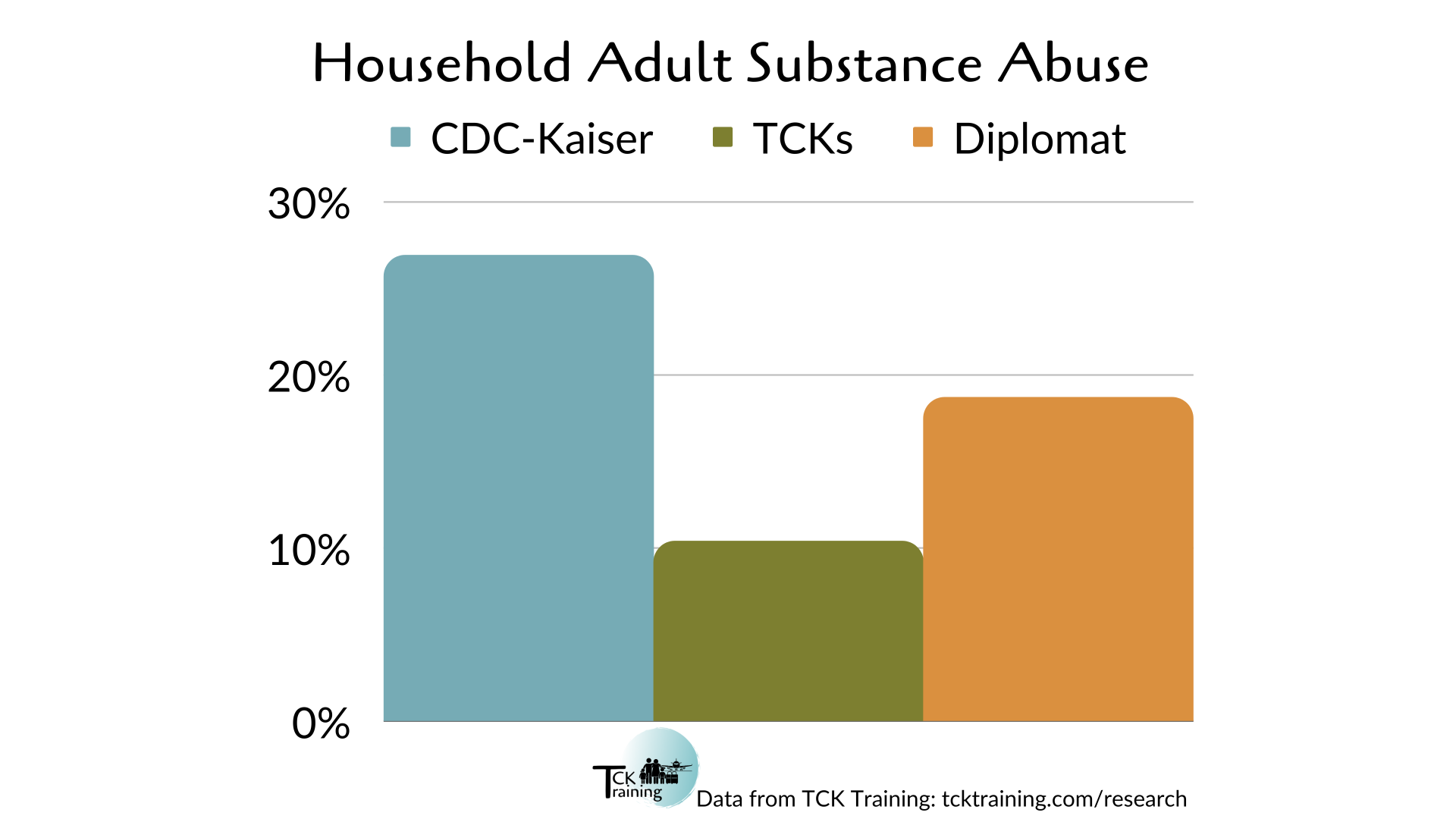
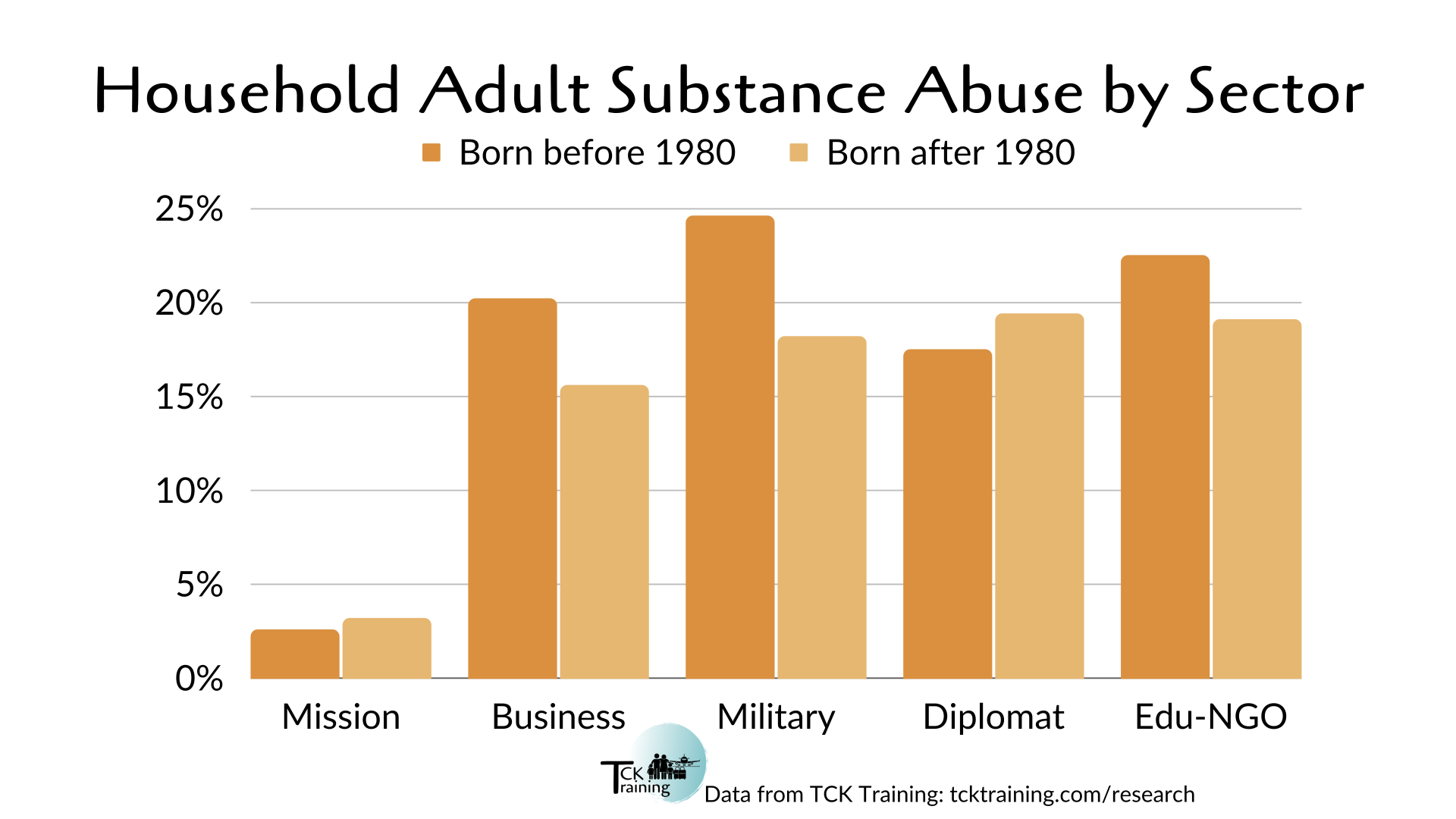
Risk Mitigation
This data can seem pretty disheartening but there is hope, with ways to mitigate the risks we’ve talked about. Globally mobile families, especially foreign service families, need support in order to meet their children’s needs and ultimately thrive. These challenges and risks are not unsolvable or reasons to despair, but rather reasons to take action in intentional ways that reflect the urgency of the matter.
This data can seem pretty disheartening but there is hope, with ways to mitigate the risks we’ve talked about. Globally mobile families, especially foreign service families, need support in order to meet their children’s needs and ultimately thrive. These challenges and risks are not unsolvable or reasons to despair, but rather reasons to take action in intentional ways that reflect the urgency of the matter.
Simple intentionality in parenting, policies, and procedures can mitigate the risk and increase the chances of positive, healthy outcomes for Third Culture Kids.
In TCKs at Risk we outline a number of ways that organizations can protect children and support families. For example, additional research into Positive Childhood Experiences (PCEs) gives a roadmap for effectively buffering children from difficulties they face.
When a person had four or more Adverse Childhood Experiences, also having at least six of these Positive Childhood Experiences lowered the risk for depression in adulthood by 72%.
With 27% of diplomat kids reporting 4 or more ACEs, these buffering protections are particularly important (source: Caution and Hope for Diplomat Kids).
Child protection is essential, and organization-level strategies should be put in place to safeguard children. Families need education to understand not only the rewards but also the risks for international life. When a government sends them abroad, that government also bears responsibility for providing adequate information and effective support. Volunteer family organizations can be wonderful, but they also need institutional backing to provide the best care possible.
Child protection is essential, and organization-level strategies should be put in place to safeguard children. Families need education to understand not only the rewards but also the risks for international life. When a government sends them abroad, that government also bears responsibility for providing adequate information and effective support. Volunteer family organizations can be wonderful, but they also need institutional backing to provide the best care possible.
Government employees working abroad, whether as diplomats or in any area of foreign service, deserve effective personal and family support to promote the long-term well-being of their children.
Protective factors such as Positive Childhood Experiences, healthy parent-child relationships and healthy parental mental health are all tangible aspects of intentionality which will assist in mitigating the risk of Adverse Childhood Experiences taking their toll on diplomat children long term.
TCK Training is here to help! We offer a range of training and support, both organization-wide and for individual families. For example, you can learn about Understanding Emotional Abuse and Neglect as a Parent, Risk Prevention for Highly Mobile Families, Raising Healthy TCKs, or learn more about applying our research in context.
TCK Training is here to help! We offer a range of training and support, both organization-wide and for individual families. For example, you can learn about Understanding Emotional Abuse and Neglect as a Parent, Risk Prevention for Highly Mobile Families, Raising Healthy TCKs, or learn more about applying our research in context.
References:
- Caution and Hope: The Prevalence of Adverse Childhood Experiences in Globally Mobile Third Culture Kids (Crossman and Wells, 2022. TCK Training.)
- TCKs at Risk: Risk Factors and Risk Mitigation for Globally Mobile Families (Crossman, Wells and Vahey Smith, 2022. TCK Training.)
- Caution and Hope for Diplomat Kids (Blog post, Crossman. TCK Training, 2022.)
- Misunderstood: The Impact of Growing Up Overseas in the 21st Century (Crossman, 2016.)
- How Diplo Life Can Affect Our Kids (Blog post, The Lonely Diplomat. Crossman, 2022).
Empty space, drag to resize
Related blog posts:
Caution and Hope for Diplomat Kids
Other blog posts in this series:
Mitigating Risk Factors for International School Students Mitigating Risk Factors for Homeschooled TCKs Mitigating Risk Factors for Christian International School Students Mitigating Risk Factors for Children of International Educators and Humanitarian Workers
Caution and Hope for Diplomat Kids
Other blog posts in this series:
- Mitigating Risk Factors for International Business Kids
- Mitigating Risk Factors for Military Kids
- Mitigating Risk Factors for Mission Kids
About the Authors
Tanya Crossman grew up in Australia and the US before moving to China at age 21; she has worked with TCKs for 20 years. She is the Director of Research and International Education at TCK Training.
Lauren is an adult TCK who grew up in East Africa and has spent nearly 10 years working with TCKs in the U.S. Her experiences have fueled her passion for supporting TCKs through preventative care that fosters healthy, thriving adults. She holds a Master’s in Public Health.



